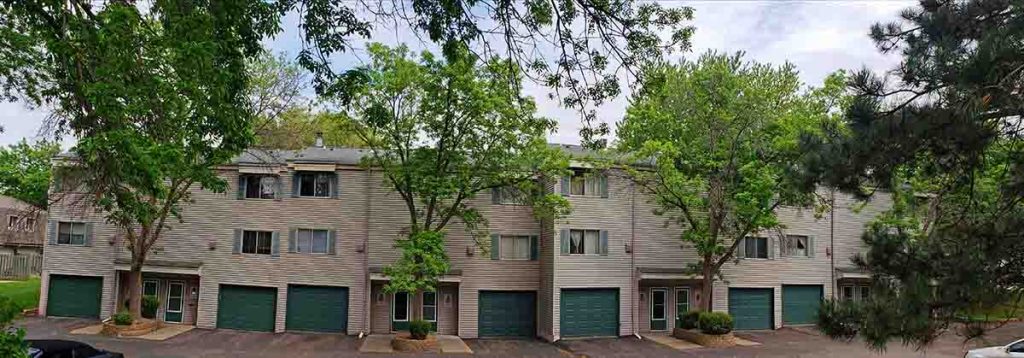Pets and Living in an HOA

Sunshine and getting outside for a walk are things we are all doing more of these days and that includes our pets. Just a few friendly reminders to be sure to pick up after your pets during this season. As more people are out walking due to the closure of many local gyms, it’s more important than ever to be diligent about picking up pet waste. The rainy weather in April also make pet waste more of a hazard for all. We encourage you to also keep your pet on a leash to ensure the safety of all in our communities. If this spring is the time to adopt a new pet once the local shelters are up and running again, then make sure you review your association’s governing documents for restrictions on the types of pets, breed, or size you can have in your home. There might also be a limit on how many pets are allowed.
Another Successful Sharper Golf Scramble

On behalf of the leadership team and everyone at Sharper Management, thank you for making the third annual Sharper Scramble appreciation golf tournament another success. Despite the 110-degree heat index, nearly 130 Sharper staff members, Board members and trusted business partners came out for a fun day of golf, food and fellowship. The event was held July 19th at Boulder Pointe Golf Club in Elko. “We put together this event as a way of saying ‘thank you’ to the many important people that have helped shape Sharper Management to the company we are today,” said Dan Cunningham, principal and chief executive officer. “From valued Board members making up our robust client list, to trusted business partners who’s quality of work reflects on our company, to the many Sharper staff members that keep this train rolling down the tracks, this event is our way of bringing us all together to celebrate.” In addition to providing a fun afternoon, the Sharper Scramble also has a charitable outreach component, important to the mission and core values of Sharper Management. This year the event helped raise $2,000 for Open Arms – a local nonprofit that cooks and delivers free, nutritious meals to people living with life-threatening illnesses across the Twin Cities. If you were unable to join us this year, we hope you will consider being a part of this great event next summer.
Sharper Offers Board Training Opportunities

Sharper Management will present two free Board training opportunities in the coming months. Both sessions will be held at the Bell Plaza office building in Bloomington, MN (3800 American Blvd W). All Board members from community associations managed by Sharper are welcome to attend. Coming January 2020 – “Board Basics: An Orientation for Board Members” This general orientation session will be led by Sharper’s two directors of community management, Candy Lee, CMCA, AMS, PCAM and Josh Reams, CMCA, AMS, PCAM. Topics covered will include: * Defining Types of “Associations” * Roles & Responsibilities of the Board * Financial Fundamentals * An Overview to Governing Documents & State Statutes * How to Run Effective Board Meetings * Insurance Basics * Property Management Practices Tuesday, October 15th 2019 at 6 p.m. – “Financial Fundamentals and Simplifying Insurance” This focused session coincides with most association’s end-of-fiscal year and insurance renewal seasons. Insurance and financials are always large and complex topics. Led by Sharper’s two directors of community management, Candy Lee, CMCA, AMS, PCAM and Josh Reams, CMCA, AMS, PCAM, in addition to trusted insurance vendor and expert, Eric Skarnes, of Insurance Warehouse, this session will cover topics such as: * Defining Types of Insurance Policies & How the Interact * Insurance Claims & How They are Handled * Market Place Update * Basic Financial Reporting * Understanding Operating Cashflow & Reserve Savings * Budgeting Process & Methods * Replacement Reserve Studies & Requirements If you are interested in reserving your spot, please email info@sharpermanagement.com
Don’t Break Your Own Rules in Rule Enforcement

Spring is here and that means Community Managers and Board members will be active in walk-arounds/site inspections while hoping to whip the association back in to shape after a long winter’s nap. Rule violations are always a focus in these efforts. Melted snow un-earths pet damage to turf; holiday lights still adorn balconies; neglected exterior maintenance items that homeowners may be responsible for become apparent; “big-boy toys” like boats and RVs begin to come out and park in driveways and guest parking; kid toys and sports equipment litter patios and common areas; and on and on. While associations should be assertive and fair in cleaning up these and other rule violations, there is one area that Boards can get themselves in trouble when it comes to enforcement – adhering to their own appeal opportunities and hearing processes. Many Declarations documents give some parameters and rights to members/homeowners when it comes to compliance and remedies in regard to rule enforcement. It is always wise to not only have a thorough Enforcement Policy (warning, first fine, second fine, etc), but also an appeal and hearing procedure as part of the Rules & Regulations document. This policy should mirror or further enhance -but never contradict – any existing language in the Declarations or ByLaws. The most common approach to creating fairness when it comes to rule remedies is to allow for an appeal and hearing procedure. Some rule violations, after all, might have extenuating circumstances, or sometimes the violation might have been applied to the incorrect offender. Allowing for an appeal procedure creates an opportunity to hear this out. This “appeal” should come in way of a “hearing” before the Board. Additionally, the Minnesota Common Interest Ownership Act (“MCIOA”) contemplates this notion when it provides that owners should be able to speak before the Board. A common approach that has been incorporated into more recent governing documents is to allow for a rule offender to be given 10 days to request a hearing before the Board. The Board then has 30 days to schedule said hearing from receipt of a formal request for a hearing (tip: which could and should be at the next scheduled Board meeting). The Board then has a reasonable amount of time to further deliberate the information presented and provide a formal written response to the owner either upholding or altering the rule violation and any corresponding sanctions. The key, however, to making this procedure work, is to be appropriately notify the homeowners of their right to appeal and hearing in all correspondences that related to the rule violation. Many Declarations (and therefore coinciding rules and enforcement policies) do state something along the lines of “the offender shall be given notice of the nature of the rule violation and the right to a hearing…” If any of the rule violation letters, be it the original warning or certainly any subsequent fines, did not state the owner had a right to an appeal and/or hearing, the Association did not follow through on their requirements for enforcement. Should the matter end up in court, a judge might likely side with the homeowner. While no one wants to add administrative steps, particularly with regards to owners breaking rules, it is important to be aware of any appeal and/or hearing procedures that may already be in place – and certainly it is important to be incorporating those requirements in enforcement efforts.
A Lesson in the Business Judgement Rule

There are two key legal terms that are often times thrown around but seldom understood in regard to serving on the Board of Directors: responsibilities and protections. As to the former (responsibilities), it is important to understand the concept of Fiduciary Duty. In short and very simplistically, it is the premise that Board members are acting for the benefit of all and for the association – and not for one’s self-interests. For a more in depth exploration of this concept, see the article from last fall: https://sharpermanagement.com/2018/10/fiduciary-duty/. As to latter (protections), if the Board is, indeed, acting for the benefit of all and exercising their “duty of care” and “duty of loyalty,” then they are typically protected from lawsuits under the umbrella known as the “Business Judgement Rule.” This premise means that actions taken by the Board, if within their powers, must reflect a reasonable and honest exercise of judgment. Given that Board members cannot always ensure success in whatever the initiative may be, the business judgment rule specifies that the court will not review the business decisions of directors who performed their duties (1) in good faith; (2) with the care that an ordinarily prudent person in a like position would exercise under similar circumstances; and (3) in a manner the directors reasonably believe to be in the best interests of the corporation. The Cornell Law School has a rather concise overview here: https://www.law.cornell.edu/wex/business_judgment_rule. Good Faith – has been covered a number of times. Acting in the best interest of the collective. With Care – this is the one that is fairly subjective and where a Board is susceptible to claims of negligence or ill-intent. Boards must always use their resources, illustrating careful thought and having researched information as contributing factors to a decision. Some examples illustrating this would include: reviewing a Management Report prior to a meeting; asking for an attorney to review a detailed or complex contract/agreement prior to executing; utilizing an engineer for an in-depth study of a complex structural problem and gathering formal recommendations; engaging with an accountant to do an annual audit of the financials; speaking directly to an insurance agent before binding coverage. Engaging with experts and showing due diligence is always a good way to prove “duty of care” was taken Best Interest – if meeting minutes reflect these steps were taken, and if the discussion and decisions happened in a recognized open meeting of the Board, the Board is acting in a reasonable manner and in the best interest of the association. As volunteers of a non-profit corporation, it is sometimes hard to recognize and accept there is a significant amount of liability put on the Board. If Fiduciary Duty is understood and followed, and Directors & Officers insurance is put in place, the Board should be comforted in the protections afforded under the Business Judgement Rule doctrine.
Board Tips: Make Your Meetings Matter

In previous issues we’ve discussed the importance of a strong meeting facilitator; we’ve suggested agenda formats to create better meeting efficiency; and recently we wrote on the principle that meetings should be regulated to making decisions. There’s no denying that we live in a culture of meetings. In this issue’s Board Tips, we offer one thought for you to consider regarding meeting frequency, and one tip for you to try to make your meetings more meaningful. Meeting Frequency – how often are you meeting as an association Board? This will certainly vary. Your Governing Documents may dictate a number of meetings to be held within a calendar year. The size and complexity of your community may require more or less meeting regularity. And situational issues or projects may dictate the volume necessity for a “meeting of the minds.” Consider the notion, however, that the more often you meet, the less productive you may be. Fewer meetings force focus – and therefore motivation to have tangible outcomes and measurable initiatives. Consider evaluating your meeting productivity. If you find that decisions are often times delayed or tabled, if your meetings are more social than business, and certainly if you have a limited number of items on your docket, consider having fewer meetings. See how it goes. The results might surprise you! Action List – to ensure that the meeting was, in fact, constructive with measurable outcomes, it is helpful to have a summary at the end of the meeting to identify and assign action items. Make a list! These can even be incorporated into the Meeting Minutes if it reflects a new business decision or resolution of the Board. Towards the end of a meeting, it is natural for people to just want to get home. Verbally summarizing and capturing, in writing, all action items is imperative. Make your meetings matter by ensuring they are productive and with measurable results.
Contractor Chat: Weathering Expectations

One of the great construction debates is to sealcoat or not to sealcoat asphalt pavement. Let’s review the primary purpose of sealcoating and then the common complaint. Sealcoating asphalt (usually driveways or streets) provides a thin layer of fine aggregate, oil and minerals to help protect and “seal” the aggregate asphalt materials that make up the pavement. It protects it from environmental factors that breakdown asphalt such as water/moisture, UV rays, and temperature change. Sealcoating is similar to painting. It protects the surface, while at the same time giving it an aesthetically pleasing and uniform appearance. Which brings us to the primary criticism of sealcoating. Everybody loves a freshly sealcoated driveway. It looks all shiny and new! But after one plow season, you’re left with blade marks and tire tread patterns. After a year or so, light spots start appearing from areas that hold water or are exposed to heavy traffic. What a waste of money that sealcoating was! After a couple of years the asphalt blends back to that uniform gray look. Did it really matter or make a difference spending the money to sealcoat? Yes, it did! Unprotected asphalt will undoubtedly break down sooner than asphalt that has been sealed. This is a similar process to what happens with exterior wood surface. If left unprotected by paint or stain, fibers will break down and rot away. The secret to sealcoating is having realistic expectations on how long that shiny new looking driveway will last.
How Association Boards and Management Companies Work Together

In an HOA, there is often confusion about who is responsible for what between the Board and Management Company. While each association and their contract with a management company is unique, we have gathered some general guidelines to help clarify these roles. The HOA and its Board are responsible for the overall operations of the community. The Board makes all decisions regarding rules and they are responsible for maintaining the value of the property through maintenance, collecting dues, paying bills, and filing taxes. The confusion often comes into play because Boards delegate certain responsibilities and administrative tasks to management companies. In a nutshell, the management company carries out the directives of the Board as their administrative arm. Management companies do not set policy. Full-service and financial-only management contracts can further add to misinterpretation of responsibilities of a management company. A full-service contract will include things like general maintenance of the association’s common areas, financial and administrative duties such as paying the bills and collecting dues, and tasks such as facilitating meetings and taking/distributing notes and notifications to residents. A financial-only contract for management is just that. The management company takes care of things relating to finances such as paying the bills, managing dues and collections, and management of the reserve fund. With many different options and the unique needs of each association, it’s easy to see why questions arise regarding who is doing what!
Committees, Committees, Committees – Part II

Welcome to Part II of Committees, Committees, Committees. As a Board member, the responsibilities and tasks to keep the association running smooth can add up quickly. And as a leader, the art of delegation is incredibly important. Committees can be a great resource to, and outlet for, the Board of Directors. The goal of this article is to understand the roles and responsibilities of committees, define the types of committees, and to provide some keys to successful utilization of them. Role of a Committee The primary function of a committee is to assist the Board in meeting their many responsibilities. Committees can do this by performing specific tasks (such as the things mentioned above) and performing research. The end goal of the work of a committee is to prepare and make recommendations to the Board. It is imperative to remember that committees (unless governing documents give it with a mandatory committee) are advisory and have no authoritative power. Power in decision making and action remains with the Board. Other benefits include broadening community input and contributions to the Association. Tips for Successful Committees Reminder – committees serve at pleasure of the Board – & are advisory groups Any committee that does have independent authority, should have detailed processes & an appeal process to the Board. Ex: architectural control committee Appoint a Board Liaison Detailed job descriptions which outline roles & responsibilities Keep Minutes Submit official recommendations to Board in writing Motivate & Empower – but Manage Authority Give meaningful tasks Give recommendations serious consideration Give public recognition for performance Committee meetings should be open to members
McKnight Townhomes and Condos Joins Sharper Management Family

Eden Prairie, Minn – (June 6, 2018) – Effective April 1st, Sharper Management is pleased to have taken over full management services for the McKnight Townhomes Condominium Association in Maplewood. Originally constructed in 1972 as a rental townhome community, it was converted to a cooperative in 1983, and then to a condominium association in 1993. McKnight is an expansive 32-building community with a total of 190 three-story homes “The sheer size and scope of McKnight is a lot to take in,” said Matt Froehlich, Owner and Chief Operating Officer of Sharper Management. “However, we have the tools and the talent to work with a very knowledgeable and dedicated Board to further enhance the resident experience and property value of the community. We are grateful for the opportunity to work with McKnight.” Founded in 2010, Sharper Management is a locally-owned, mid-sized property management company offering a full suite of premiere services to homeowner and commercial associations of all sizes. Sharper Management currently provides services to the Minneapolis-St. Paul seven-county area.
